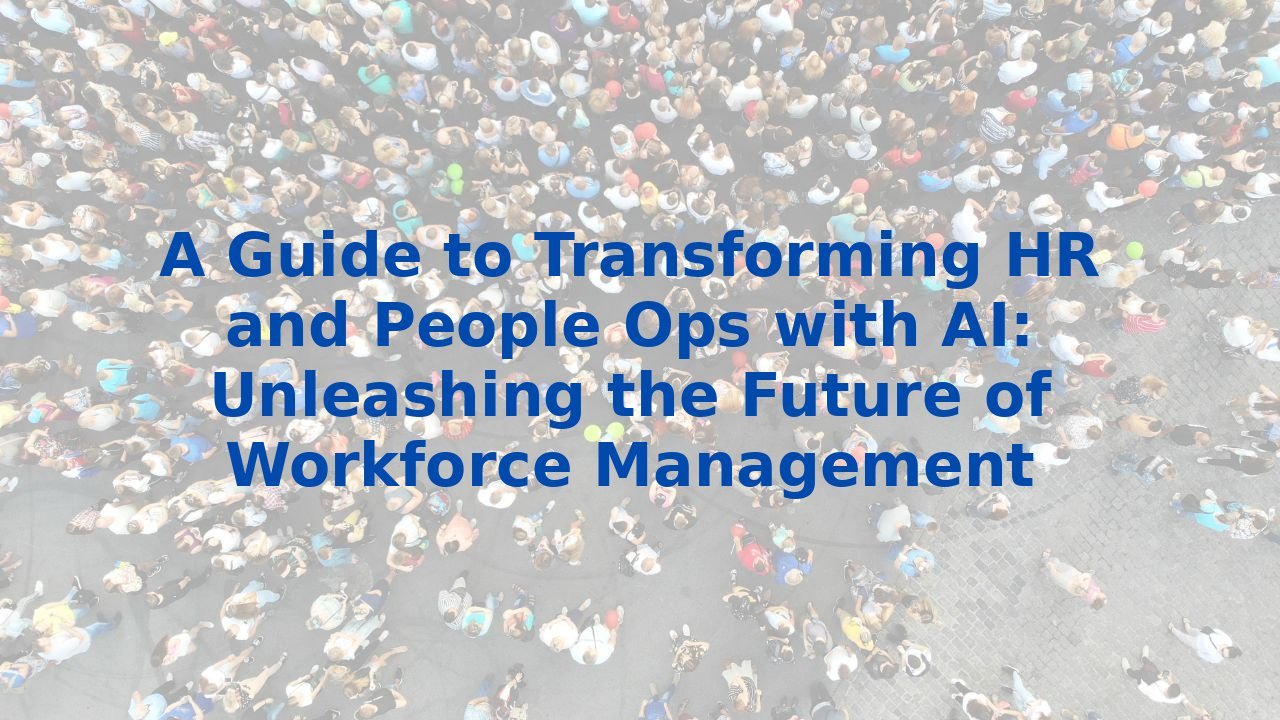A Guide to Transforming HR and People Ops with AI: Unleashing the Future of Workforce Management
A Guide to Transforming HR and People Ops with AI: Unleashing the Future of Workforce Management
Introduction
In today's fast-paced business environment, the realms of human resources (HR) and people operations (People Ops) are undergoing a crucial evolution. Artificial intelligence (AI) sits at the forefront of this change, offering a wealth of potential to streamline management processes and foster employee engagement. As we explore how AI can fundamentally reshape HR practices, we'll delve into specific business processes and the multitude of benefits that come from embracing this cutting-edge technology.
Enhancing Recruitment and Talent Management
The recruitment landscape has always been competitive, making the ability to identify and attract top talent more essential than ever. AI has the power to transform this process significantly. By automating tasks like resume screening, candidate matching, and interview scheduling, AI allows HR professionals to allocate their time to more strategic endeavors.
For instance, AI-powered tools analyze vast datasets, providing insights that allow organizations to pinpoint the most suitable candidates. Instead of sifting through endless resumes, HR teams can focus on building relationships and creating compelling value propositions for prospective hires. Moreover, AI chatbots can facilitate initial interactions with applicants, offering a personalized experience and filtering unqualified candidates early on.
Improving Employee Engagement
Once talent is brought on board, keeping employees engaged is key to retention and productivity. AI can unlock deeper insights into employee sentiments and preferences through advanced analytics and sentiment analysis. Organizations can utilize these insights to identify dissatisfaction or disengagement promptly and implement targeted interventions to nurture a more positive work environment.
AI-driven tools contribute to tailoring employee development plans as well. Imagine a scenario where employees receive individualized support based on their skills and aspirations. This level of personalization enhances growth opportunities and reaffirms employees' value within the organization, ensuring they feel heard and supported in their career advancement.
Streamlining Performance Evaluation
Conventional performance evaluations often struggle with subjectivity, leading to discrepancies and dissatisfaction among employees. The integration of AI in performance management can provide objective metrics and automated feedback systems that ensure fairness and clarity in evaluations.
AI tools are capable of analyzing performance data, recognizing trends, and delivering actionable insights to managers. By doing so, they save time while fostering a culture of transparency and accountability. This not only leads to more accurate evaluations but also helps reduce biases, ultimately creating a healthier workplace dynamic.
Benefits of AI Training for Employees
While the technological advantages of AI are compelling, ensuring that employees are equipped to leverage these advancements is equally critical. AI literacy becomes paramount, enabling staff to grasp the capabilities and limitations of AI tools. Training programs designed to enhance AI skills empower employees to generate insightful inquiries and critically assess the outcomes of AI systems.
As companies strive for efficiency, investing in comprehensive AI training offers a twofold advantage. It enhances individual productivity and fortifies the organization's overall capacity to adapt to technological shifts, positioning teams to thrive in a competitive landscape. Organizations can explore resources that offer AI training tailored for their workforce, enabling all team members to harness the benefits of AI effectively.
Conclusion
The integration of AI into HR and People Ops processes is not just a trend—it's a pivotal change defining the future of workforce management. By embracing AI to enhance recruitment, engagement, and performance evaluation, organizations can unlock new levels of efficiency, accuracy, and employee satisfaction.
As AI technology continues to advance, it is essential for HR teams to stay proactive, adapting and evolving their strategies. Through proper training and effective implementation, organizations can create a culture that not only meets the demands of today but thrives well into the future, continually fostering an innovative and productive work environment.



